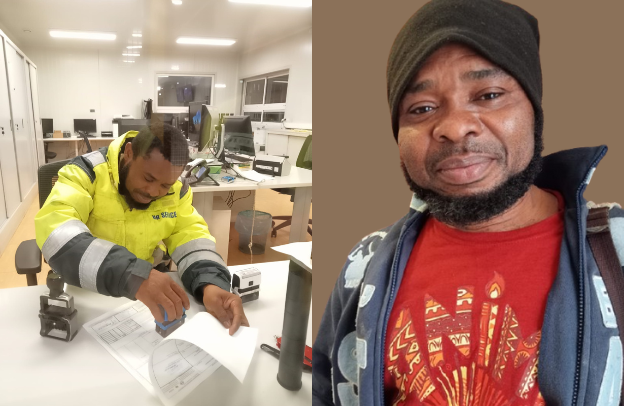Entrepreneurial Spirit in the Diaspora: Lessons from Ikechukwu Micheal a Nigerian Barber in Italy

This morning, under the gentle light of the Verona sun, I had the chance to meet with Ikechukwu Michael, a Nigerian barber living in Italy. His story, like so many others in the African diaspora, is one of passion, perseverance, and purpose. Despite the challenges of balancing two jobs and navigating life in a foreign land, Michael continues to pursue his passion for barbering while working night shifts at a food factory.
Want to learn more about storytelling? Start by downloading the first chapter of The Storytelling Mastery.
I met Michael in Verona as part of my ongoing research into the presence of Africans in northern Italy, a project I began in 2013 to document how Africans are building lives here.
What strikes me in these interviews is the resilience and resourcefulness of people who, despite cultural and economic obstacles, have managed to not only survive but thrive. Today, I share Michael’s story because it speaks to the power of the entrepreneurial mindset and how it helps individuals stand out and live on their own terms.
Michael’s story is a powerful reminder that entrepreneurship is not just about financial gain—it’s about identity, purpose, and standing out in a world that often demands conformity. The African diaspora has long been known for its resilience and resourcefulness, and Michael’s journey is no exception.
From Festac Lagos to Verona: A Life Built on Skill
Michael’s journey as a barber began over 22 years ago in Festac Town, Lagos, where he owned two thriving barbershops. In Nigeria, barbering was more than just a job for him—it was a way of life. “I’ve been a barber for over 22 years, starting back in Nigeria,” he shared with me. “I owned two barbershops in Festac Town before moving to Italy. Barbering is not just something I do for money; it’s a part of who I am.”
See also The Power of Reflection: Evaluating Your Business to Find Strengths and Opportunities
The move to Italy brought a wave of challenges. Like many immigrants, Michael initially struggled to find his footing in a new country. Although he managed to secure a job working night shifts at a food factory, where he operates a forklift, the fire of his true passion never dimmed. “Even though I often work night shifts and should be resting during the day, I still find time to cut hair whenever someone calls me,” Michael told me, with a smile that radiated pride. “Today, I’ll be back at work by 4:00 p.m., but for now, I’m out here doing what I love.”
In the African diaspora, stories like Michael’s are not uncommon. Many African immigrants, including those I have been interviewing in Verona since 2013 bring valuable skills with them when they move to Europe, the United States, or other parts of the world.
These skills, whether in barbering, tailoring, cooking, or other trades, often serve as lifelines in foreign lands where job opportunities may be scarce for immigrants.
According to the International Organization for Migration (IOM), over 36% of African migrants in Europe are employed in sectors such as manufacturing, construction, and agriculture, but many, like Michael, are also engaged in entrepreneurship as a means of supplementing their income and maintaining a connection to their home cultures.
Building a Client Base in a Foreign Land
One of the most challenging aspects of starting a business in a foreign country is building a client base.
I asked Michael how he managed to attract clients in Italy, where he had no established connections. His answer was simple but insightful: “It all comes down to who you know,” he said. “When I first arrived in Verona, I began visiting different churches. I would introduce myself to people, letting them know I’m a professional barber. One person might say, ‘Give me your number; I will call when my son or husband needs a haircut.’ Then I would move on to another church and do the same, and that’s how I built my client base. I am still cutting the hair of many of those clients today, right in their homes since I don’t have a barbershop here.”
This grassroots approach to building a network is a hallmark of entrepreneurship within the African diaspora. Without access to formal business networks, many African immigrants rely on their communities for support.
You might also like to see Collaborations and Networking: How to Build a Creative Ecosystem That Can Fuel Your Business
Churches, cultural associations, and social events often serve as key platforms for networking and business development. For Michael, visiting churches wasn’t just a way to practice his faith—it was a strategic move to grow his clientele.
Michael’s story resonates with the experiences of many African entrepreneurs in Italy and across Europe. According to a 2020 report by the European Union Agency for Fundamental Rights (FRA), Africans make up a significant portion of small business owners in Europe, particularly in sectors such as personal care, retail, and food services.
Many of these entrepreneurs started small, like Michael, relying on word-of-mouth referrals and community connections to grow their businesses.
Juggling Two Jobs, Pursuing One Passion
One of the most remarkable aspects of Michael’s story is his ability to balance two demanding jobs. Working night shifts at a food factory while maintaining a thriving side business as a barber is no small feat.
I asked him how he managed to do both, and his response was grounded in practicality. “It’s definitely possible because I work the night shift, which leaves my mornings free to focus on other things,” he explained. “Sometimes I’m tired, but you have to push through. If you want something bad enough, you will find a way to make it work.”
For Michael, entrepreneurship is not just about making money—it’s about maintaining a sense of control over his life. By cutting hair in addition to his factory job, he’s able to stay connected to his passion while also providing for his family. “The job I am doing in a company now won’t last forever,” he said. “There comes a point in life when you need to focus on your own craft, and barbering is my true profession.”
This balancing act is a familiar story for many in the African diaspora who must work multiple jobs to make ends meet while holding onto their personal passions. In fact, the entrepreneurial spirit is a common thread among African immigrants.
See also Celebrating African Diaspora Heritage: An Insightful Conversation with Loretta Green-Williams
A 2019 report by the Migration Policy Institute (MPI) found that African immigrants in the United States are more likely than other immigrant groups to start their own businesses. This entrepreneurial drive, rooted in both necessity and cultural values, helps many Africans in the diaspora stand out in their adopted countries.
Passion Over Profit: The Calling That Keeps Him Going
As our conversation continued, I asked Michael if he ever thought of abandoning barbering to focus solely on his factory job. His answer was firm: “I will never abandon my barbering skills. As the Igbo people of Nigeria say, ‘An old woman never forgets the dance she knew in her youth.’ In the same way, I can never forget barbering because it’s a part of who I am.”
For Michael, barbering is more than just a way to earn money—it’s a calling. This sense of identity and connection to his craft is what keeps him going, even when the demands of his factory job leave him exhausted.
In many ways, Michael’s story mirrors that of countless other African entrepreneurs who have built businesses based on skills they learned in their home countries. Whether it’s tailoring, cooking, or cutting hair, these skills are more than just trades—they’re integral parts of their identities.
This is particularly true for the African diaspora, where entrepreneurship often serves as a means of cultural preservation. By continuing to practice their trades, African immigrants maintain a connection to their heritage, even as they navigate life in foreign countries.
A 2021 study by the Organisation for Economic Co-operation and Development (OECD) found that entrepreneurship is a key driver of economic integration for African immigrants in Europe.
For many, starting a business is not just about financial independence—it’s about preserving their cultural identities and passing on their skills to the next generation.
The Power of Entrepreneurship in the African Diaspora
Michael’s story is just one example of how entrepreneurship can empower individuals in the African diaspora to stand out and live on their own terms. His journey, from owning barbershops in Lagos to cutting hair in Verona, illustrates the resilience and adaptability that define the immigrant experience.
Entrepreneurship, for Michael, is not just about survival—it’s about thriving in a world that often presents obstacles for immigrants.
In my ongoing research into the African diaspora in northern Italy, I have come across countless stories like Michael’s. Whether it’s the Ethiopian restaurateur in Milan or the Ghanaian seamstress in Bologna, African immigrants are making significant contributions to their local economies through entrepreneurship.
In fact, according to a 2020 report by the African Development Bank, African immigrants in Europe send more than $46 billion in remittances back to their home countries each year. This financial contribution, fueled in large part by entrepreneurial endeavors, plays a critical role in supporting families and communities across Africa.
But beyond the financial impact, African entrepreneurs in the diaspora are also creating cultural bridges. Through their businesses, they introduce their host countries to African traditions, foods, and customs, enriching the cultural landscape of Europe and beyond.
Michael’s barbering business, for example, is more than just a way to make money—it’s a way to share his culture and connect with others in the African community.
Standing Out by Standing Firm
As our interview came to a close, I couldn’t help but reflect on the lessons Michael’s story offers. In a world where immigrants often face barriers to success, his entrepreneurial spirit stands as a testament to the power of perseverance and passion.
Michael’s refusal to give up on his craft, even in the face of long hours and physical exhaustion, is a reminder that entrepreneurship is not just about financial gain—it’s about living life on your own terms.
See also Harnessing the Power of African Diaspora Heritage for Positive Change
For the African diaspora, standing out in the creative economy requires more than just skill—it requires an entrepreneurial mindset. It requires the willingness to take risks, the resilience to overcome challenges, and the determination to pursue one’s passion despite the odds.
Entrepreneurs like Michael, who continues to cut hair after night shifts at a factory, are proof that with the right mindset, we can all stand out by standing firm in our purpose.
Conclusion: Finding Your Unique Path
In sharing Michael’s story, I hope to inspire others in the African diaspora and beyond to embrace their unique skills and passions. Whether you’re an entrepreneur, artist, or professional, the key to standing out lies in owning your story and following your passion with relentless determination.
As Michael’s journey from Festac to Verona shows, the entrepreneurial spirit can thrive anywhere, as long as we have the courage to stand out by standing firm in who we are.
Want to learn more about storytelling? Start by downloading the first chapter of The Storytelling Mastery.





